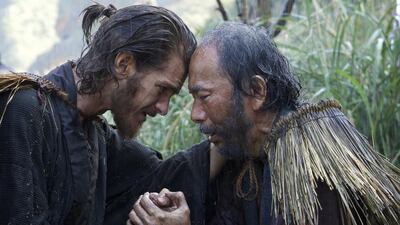James Mottram
Silence
Director: Martin Scorsese
Starring: Andrew Garfield, Adam Driver, Liam Neeson, Ciarán Hinds, Issey Ogata
Four stars
Martin Scorsese's first film since 2013's The Wolf of Wall Street feels like a radical cleansing of the soul.
Just as he followed pool-shark, dollar-hungry tale The Color of Money (1986) with his controversial religious saga The Last Temptation of Christ (1988), and gangster classic Casino (1995) with his Dalai Lama film Kundun (1997), so Silence feels like the perfect spiritual antidote to the lurid exploits of Jordan Belfort and his Wall Street cronies.
Based on the 1966 novel by Japanese author Shūsaku Endō, Silence a tale of faith and belief, as two 17th Century Jesuit priests travel to Japan on a divine mission.
If you're expecting a meditative film looking to the heavens, however, you may be surprised. Silence starts with Father Christovao Ferreira (Liam Neeson) watching others being tortured for their Christian beliefs, which have been outlawed in Japan, scalded by boiling water dripped on their skin.
Set in a time and place where simple worship can lead to death, violence pricks Silence at every turn. Ferreira's former pupils, Sebastian Rodrigues (Andrew Garfield) and Francisco Garupe (Adam Driver), travel to this brutal, feudal landscape in search of their mentor.
Rumour has it that Ferreira has renounced his religion – and who could blame him? After Portuguese missionaries started spreading the Catholic faith in this Buddhist and Shinto land in the 16th Century, Catholicism was banned by authorities fearing the encroaching influence of the west.
Believers were driven underground – the so called Kakure Kirishitans, the ‘Hidden Christians’ – and, as the film’s opening shows, those who were caught were shown no mercy.
Secretly brought to Japan with the help of Kichijiro (Yosuke Kubozuka), whose own beliefs are frequently called into question, the priests make contact with the Hidden Christians.
Lacking any spiritual nourishment, these fearful peasants are desperate for priests to absolve their sins. Such is the threat of being caught, however, Rodrigues and Garupe are forced to hide in the mountains like outlaws, with little in the way of sustenance to keep them alive.
In such an inhospitable environment, they – like so many characters in the film – begin to question their faith. The ‘silence’ of the title refers to unanswered pleas from the priests as they pray to God, desperate for a sign that they are on the right path.
Amid all this, their search continues for Ferreira, a man whose spirit seems to haunt the whole of the film. Softly-spoken Neeson, who previously worked with Scorsese on Gangs of New York, is perfectly cast.
Co-scripted by Scorsese’s regular collaborator Jay Cocks, the film switches between Japanese and English dialogue (which feels a little odd when the priests are talking about the Portuguese language).
Driver is a steady presence, albeit largely absent for the film's second half, leaving Garfield to shoulder the film. His character's quest drives the story and the actor – who can also still be seen in cinemas as a God-fearing soldier in Hacksaw Ridge, for which he is nominated for a Best Actor Oscar – gives an impressively mature performance.
The Japanese cast also excels – with Issey Ogata as the whiny-voiced Inquisitor the standout.
At 161 minutes, Silence takes its time but never feels overindulgent. Scorsese's regular editor, Thelma Schoonmaker, sees to that. There are some trademark flourishes – wonderful overhead shots leave a stirring impression – but this is not the director at his most stylised. He doesn't need to be.
Here, his interest lies in the pain and agony, physical and spiritual, as characters wrestle with personal religious demons.
Silence will mystify those expecting an urban Scorsese classic such as The Departed – but for those willing to succumb to its rhythms, it is richly rewarding.

